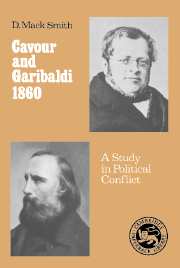Book contents
- Frontmatter
- Contents
- Preface
- Abbreviations
- Introduction
- Chapter I Political opinions in Sicily: April–June 1860
- Chapter II Cavour and the diplomats: April–June
- Chapter III La Farina and Crispi: June
- Chapter IV Arguments for and against annexation
- Chapter V Arguments over ways and means
- Chapter VI Crispi loses the first round: June
- Chapter VII Cavour loses the second round: July
- Chapter VIII Cavour adjusts his policy: July
- Chapter IX Depretis begins his prodictatorship: July
- Chapter X Cavour plans a revolt at Naples: July
- Chapter XI Cavour fails at Naples: August
- Chapter XII Political differences in Sicily: August
- Chapter XIII Cavour forces Depretis to a choice: 1–8 September
- Chapter XIV Depretis fails to persuade Garibaldi: 8–14 September
- Chapter XV Garibaldi succeeds at Naples: 1–15 September
- Chapter XVI Cavour breaks with Garibaldi: September
- Chapter XVII The radicals at bay: September
- Chapter XVIII Mordini the new prodictator: 17–25 September
- Chapter XIX Further controversy over annexation: September–October
- Chapter XX Mordini summons an assembly: 5 October
- Chapter XXI Pallavicino fights for a plebiscite: 8 October
- Chapter XXII Parliament supports Cavour: October
- Chapter XXIII Mordini changes his mind: 9–13 October
- Chapter XXIV Garibaldi makes his decision: 9–13 October
- Chapter XXV The plebiscite in Sicily: October
- Chapter XXVI The doubtful significance of the vote: October–November
- Chapter XXVII Cavour's government in the south: November–December
- Chapter XXVIII Conclusion
- Index
Chapter XXIII - Mordini changes his mind: 9–13 October
Published online by Cambridge University Press: 30 October 2009
- Frontmatter
- Contents
- Preface
- Abbreviations
- Introduction
- Chapter I Political opinions in Sicily: April–June 1860
- Chapter II Cavour and the diplomats: April–June
- Chapter III La Farina and Crispi: June
- Chapter IV Arguments for and against annexation
- Chapter V Arguments over ways and means
- Chapter VI Crispi loses the first round: June
- Chapter VII Cavour loses the second round: July
- Chapter VIII Cavour adjusts his policy: July
- Chapter IX Depretis begins his prodictatorship: July
- Chapter X Cavour plans a revolt at Naples: July
- Chapter XI Cavour fails at Naples: August
- Chapter XII Political differences in Sicily: August
- Chapter XIII Cavour forces Depretis to a choice: 1–8 September
- Chapter XIV Depretis fails to persuade Garibaldi: 8–14 September
- Chapter XV Garibaldi succeeds at Naples: 1–15 September
- Chapter XVI Cavour breaks with Garibaldi: September
- Chapter XVII The radicals at bay: September
- Chapter XVIII Mordini the new prodictator: 17–25 September
- Chapter XIX Further controversy over annexation: September–October
- Chapter XX Mordini summons an assembly: 5 October
- Chapter XXI Pallavicino fights for a plebiscite: 8 October
- Chapter XXII Parliament supports Cavour: October
- Chapter XXIII Mordini changes his mind: 9–13 October
- Chapter XXIV Garibaldi makes his decision: 9–13 October
- Chapter XXV The plebiscite in Sicily: October
- Chapter XXVI The doubtful significance of the vote: October–November
- Chapter XXVII Cavour's government in the south: November–December
- Chapter XXVIII Conclusion
- Index
Summary
Cavour's first speech to parliament, moderate in phraseology but uncompromising in tone, was known in Sicily on 9 October, a week late, and' was published in the newspapers of Palermo on the 10th. This was the first time Cavour had pronounced so outspokenly on the affairs of southern Italy, and the fact that he was speaking ex officio made his challenge to the revolution even more startling. It remained to see what effect this would have on Mordini, and whether the prodictatorial government would surrender quietly and without making further trouble.
Several communications sent to Sicily from the north give us some idea of early reactions against what Cavour had said. The Genoese correspondent of the Palermo L'Assembled thus wrote a letter from the point of view of an autonomist, full of astonishment at Cavour's volte face, and giving his explanation of the reasons for it. The prime minister had formerly assured him many times, and in the presence of Count Amari, that Sicily had a just title to self-government. They had pointed out to Cavour how, even in the worst days of Neapolitan domination, Sicily had never been deprived of her supreme court, or of her distinct financial system with its separate treasury and national debt. But if she were now to be merged in with the rest of Italy, these old privileges would be threatened. Under a centralized system she would be less free than before; and there would be the added disadvantage that, instead of the capital city being twelve to fourteen hours distant at Naples, it would lie half-way across Europe in remote Turin.
- Type
- Chapter
- Information
- Cavour and Garibaldi 1860A Study in Political Conflict, pp. 340 - 355Publisher: Cambridge University PressPrint publication year: 1985

